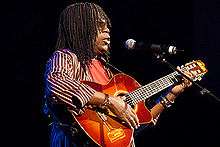Milton Nascimento
| Milton Nascimento | |
|---|---|
 Milton Nascimento during a performance. | |
| Background information | |
| Birth name | Milton Nascimento |
| Also known as | Bituca |
| Born | October 26, 1942 |
| Origin | Três Pontas, Minas Gerais, Brazil[1] |
| Genres | MPB, Pop Rock , Rock and roll, Jazz |
| Occupation(s) | Singer, songwriter, guitarist |
| Instruments | Guitar, Piano |
| Years active | 1962–present |
| Labels |
Warner Music Brazil Sony Music Brazil Philips Records EMI Music Brazil Warner Bros. Records Blue Note/EMI Records Nonesuch/Elektra Records |
| Associated acts | Clube da Esquina |
Milton Nascimento (Portuguese pronunciation: [miwˈtõ nasiˈmẽtu]; born October 26, 1942, Rio de Janeiro,[2] Rio de Janeiro, Brazil) is a prominent Brazilian singer-songwriter and guitarist.
Biography
Nascimento's mother, Maria Nascimento, was a maid. As a baby, Milton Nascimento was adopted by a couple who were his mother's former employers; Josino Brito Campos, a bank employee, mathematics teacher and electronic technician and Lília Silva Campos, a music teacher and choir singer. When he was 18 months old, Nascimento's biological mother died, and he moved with his adopted parents to the city of Três Pontas, in the state of Minas Gerais.
Nascimento was an occasional DJ on a radio station that his father once ran.[3] He lived in the boroughs of Laranjeiras and Tijuca in Rio de Janeiro.
In the early stages of his career, Nascimento played in two samba groups, Evolussamba and Sambacana. In 1963, he moved to Belo Horizonte, where his friendship with Lô Borges led to the Clube da Esquina ("corner club") movement.[4] Members included Beto Guedes, Toninho Horta, Wagner Tiso, and Flávio Venturini, with whom he shared compositions and melodies. One composition was "Canção do Sal", which was first interpreted by Elis Regina in 1966 and led to a television appearance with Nascimento.[3] The collective, as well as some others, released Clube da Esquina in 1972. Several hit singles were also released.[5]
Nascimento is famous for his falsetto and tonal range, as well for highly acclaimed songs such as "Maria, Maria", "Canção da América" ("Song from America"/"Unencounter"), "Travessia" ("Bridges"), "Bailes da Vida", and "Coração de Estudante" ("Student's Heart"). The lyrics remember the funeral of the student Edson Luís, killed by police officers in 1968. The song became the hymn for the Diretas Já social-political campaign in 1984, was played at the funeral of the late President of Brazil Tancredo Neves the next year, and was also played at Ayrton Senna's funeral.
While his reputation within Brazil was firmly established with his Clube da Esquina works, Nascimento's international breakthrough came with his appearance on jazz saxophonist Wayne Shorter's 1974 album Native Dancer. This led to widespread acclaim, and collaborations with stars such as Paul Simon, Cat Stevens, George Duke and Quincy Jones and the band Earth, Wind and Fire. Angelus (1994) features appearances by Pat Metheny, Ron Carter, Herbie Hancock, Jack DeJohnette, Nana Vasconcelos, Jon Anderson, James Taylor, and Peter Gabriel. Through his friendship with guitarist Warren Cuccurullo, Nascimento came to work with the pop rock band Duran Duran in 1993. Nascimento co-wrote and performed the song "Breath After Breath", featured on the band's 1993 album Duran Duran.[5] He also performed with the band in concert when they toured in Brazil in support of that album.
In 1996, Nascimento contributed the song "Dancing" to the AIDS-Benefit Album Red Hot + Rio produced by the Red Hot Organization.
In 2004, he worked with the Brazilian Heavy Metal band Angra, in the song "Late Redemption". The song is in the Temple of Shadows album.[6]
Discography
|
|
- More album-pages linked at pt:Categoria:Álbuns de Milton Nascimento.
Academic title
- Honorary doctorate of music, awarded by the Berklee College of Music,[8] May 7, 2016.
References
- ↑ Milton Nascimento at AllMusic
- ↑ "Milton Nascimento - Dicionário Cravo Albin da Música Popular Brasileira". Dicionário Cravo Albin da Música Popular Brasileira.
- 1 2 Skelly, Richard. "Biography". Allmusic. All Media Guide. Retrieved 2008-03-22.
- ↑ Essinger, Silvio. "Clube da Esquina (Club on the Corner)". AllBrazilianMusic. CliqueMusic Editora. Retrieved 2008-03-22.
- 1 2 "Milton Nascimento". World Music Central. World Music Portal. Retrieved 2008-03-22.
- ↑ "Encyclopaedia Metallum: The Metal Archives - Angra - Temple of Shadows". The Metal Archives. Retrieved 2012-04-10.
- ↑ Far Out Recordings Archived May 10, 2009, at the Wayback Machine.
- ↑ Milton Nascimiento honored at commencement, official site of the Berklee College of Music.
Sources
- Motta, Nelson (2001). Noites Tropicais (in Portuguese). Rio de Janeiro, Brazil: Objetiva. ISBN 85-7302-292-2.
- Dolores, Maria. (2006). Travessia: A Vida De Milton Nascimento (in Portuguese). RCB.
- Mei, Giancarlo (2004). Canto Latino: Origine, Evoluzione e Protagonisti della Musica Popolare del Brasile. Preface by Sergio Bardotti; Afterward by Milton Nascimento. Viterbo, Italy: Stampa Alternativa-Nuovi Equilibri.
- McGowan, Chris; Pessanha, Ricardo (1998). The Brazilian Sound: Samba, Bossa Nova and the Popular Music of Brazil (2nd ed.). Philadelphia, Pennsylvania: Temple University Press. ISBN 1-56639-545-3.
Perrone, Charles A. Masters of Contemporary Brazilian Song: MPB 1965-1985. Austin: University of Texas Press, 1989. Chapter 4.
External links
| Wikimedia Commons has media related to Milton Nascimento. |
| Wikiquote has quotations related to: Milton Nascimento |
- Milton Nascimento – official website
- Milton Nascimento discography at Discogs
- Interview with Nascimento, 1988 (Portuguese)
- Milton Nascimento: 12 Essential Performances by Ted Gioia (jazz.com)